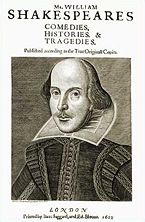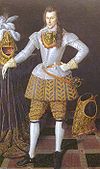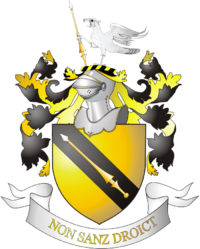- Portal:Shakespeare
-
- Wikipedia portals:
- Culture
- Geography
- Health
- History
- Mathematics
- Natural sciences
- People
- Philosophy
- Religion
- Society
- Technology
Main page Complete Works Shakespeare Topics William Shakespeare is considered by many to be the greatest writer in the English language, as well as one of the greatest in Western literature, and the world's pre-eminent dramatist. For over 400 years, his work has been performed, read and analysed by millions.
Shakespeare is believed to have produced most of his work between 1586 and 1616, although the exact dates and chronology of the plays attributed to him are often uncertain. He is counted among the very few playwrights who have excelled in both tragedy and comedy, and his plays combine popular appeal with complex characterisation, poetic grandeur and philosophical depth.
Shakespeare's works have been translated into every major living language, and his plays are continually performed all around the world. In addition, quotations from his plays have passed into everyday usage in many languages. Over the years, many people have speculated about Shakespeare's life, raising questions about his sexuality, whether he was secretly Catholic, and debating whether someone else wrote some or all of his plays and poetry.
Shakespeare's sonnets, or simply The Sonnets comprise a collection of 154 poems in sonnet form written by William Shakespeare that deal with such themes as love, beauty, politics, and mortality. The poems were probably written over a period of several years. All but two first appeared in a 1609 collection; numbers 138 ("When my love swears that she is made of truth") and 144 ("Two loves have I, of comfort and despair") had previously been published in a 1599 miscellany entitled The Passionate Pilgrim.
The Sonnets were published under conditions that have become unclear to history. For example, there is a mysterious dedication at the beginning of the text wherein a certain "Mr. W.H." is described as "the only begetter" of the poems by the publisher Thomas Thorpe, but it is not known who this man was. (A popular contender is Henry Wriothesley, 3rd Earl of Southampton, right.) Also, although the works were written by William Shakespeare, it is not known if the publisher used an authorized manuscript from him, or an unauthorized copy.
Archive • Read More...- that the tragic ending of Shakespeare's King Lear was found to be so distasteful that it was replaced on stage for over 150 years by Nahum Tate's adaptation, with a happy ending and a love story?
- that the classical unities are only observed by two of Shakespeare's plays, The Comedy of Errors (one of his first) and The Tempest (among his last)?
- that the 18th-century play Double Falshood, claimed by its author Lewis Theobald to be reconstructed from manuscripts by the Bard, may be all that remains of the lost Shakespeare play Cardenio?
- that Shakespeare himself was believed to dabble in acts of homosexuality during his life?
“ For God's sake, let us sit upon the ground
And tell sad stories of the death of kings:
How some have been depos'd, some slain in war,
Some haunted by the ghosts they have depos'd,
Some poison'd by their wives, some sleeping kill'd;
All murder'd: for within the hollow crown
That rounds the mortal temples of a king
Keeps Death his court.” Richard II, Act. 3, Sc. 2Arts Classical Civilisation Charles Dickens Literature Poetry Oscar Wilde Theatre Categories:- William Shakespeare
- Biography portals
- Literature portals
Wikimedia Foundation. 2010.







